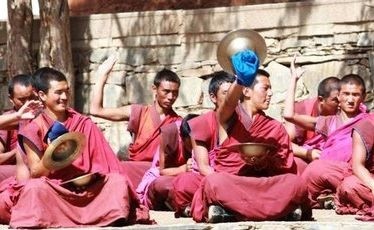A group of young Tibetan lamas continues to play for a band that has been in existence for some 300 years, taking on Labrang’s musical tradition that has been listed as a national cultural heritage in 2008, the Xinhua News Agency reported.
Trinley Gyatso, in-charge of the Daode'er Music Band, leads the group that practices regularly. He is 73 years old and has been a band member for more than 50 years.
"We practice our music skills on a regular basis. Ahead of important occasions, we practice about eight hours every day," Gyatso said. "Summertime is a busy practice time, because in winter, when the weather is dry and harsh, the instruments may crack if played too often."
The Labrang Monastery is one of the six great monasteries of the Gelugpa school of Tibetan Buddhism. The monastery is located in Gansu Province in northwest China and considered as the most important monastery outside the Tibetan Autonomous Region.
The Daode'er band was founded in the 18th century. The band plays only for reserved important occasions, such as banquets, preaching, religious parades and the arrival of distinguished guests, using flutes, pipes and gongs.
At present, the band consists of 24 members, but its size can change depending on occasions. It has received invitations to visit Britain, Belgium, Canada, France, the United States and other countries, gaining global audiences in recent years.
"Our first overseas performance was in France in 1997. It was a total success," Gyasto said.
Gyatso added that companies offered help to record the band's music and sell their discs online to audiences abroad.
"We pray for happiness, harmony and peace with our music," Gyatso said.
Gyatso added that tradition requires that only monks from Labrang can become band players.
The 73-year-old band leader said that, every year, he selects young monks who show interest in music. The new recruits must be able to learn all the instruments and recite religious scriptures to enhance their understanding of the music. The new member can only take part in a public performance after at least two years.
"We have only recruited four new players in the past three years. I hope more younger monks can play and carry on the music tradition," Gyatso added.



























